- Home
- Media Kit
- MediaJet
- Current Issue
- Past Issues
- Ad Specs-Submission
- Reprints (PDF)
- Photo Specifications (PDF)
- Contact Us
- PRIVACY POLICY
- TERMS OF USE
![]()
ONLINE
![]()
ONLINE

Turning Challenges
Into Opportunities
Editors’ Note
Michael Dowling is one of healthcare’s most influential voices, taking a stand on societal issues such as gun violence and immigration that many health system CEOs shy away from. His leadership has been invaluable to Northwell’s consistent expansion and prominence. In March 2020, he successfully navigated the health system through the first COVID-19 epicenter in the U.S., detailing Northwell’s experiences in a book titled, Leading Through a Pandemic: The Inside Story of Humanity, Innovation, and Lessons Learned During the COVID-19 Crisis. Overall, Northwell treated over 300,000 COVID patients – more than any other U.S. health system.
Prior to becoming CEO in 2002 and joining Northwell in 1995, Dowling served in New York State government for 12 years, including seven years as State Director of Health, Education, and Human Services and Deputy Secretary to the Governor. He was also Commissioner of the State Department of Social Services. Earlier, he was a Professor of Social Policy and Assistant Dean at the Fordham University Graduate School of Social Services and Director of the Fordham campus in Westchester County. Dowling has been honored with many awards and recognitions over the years, including the Ellis Island Medal of Honor, the Presidential Distinguished Service Award for the Irish Abroad, the Alfred E. Smith Award from the American Society for Public Administration, the National Human Relations Award from the American Jewish Committee, and the Foreign Policy Association Medal Award. In 2017, he was selected to serve as the Grand Marshal of New York’s St. Patrick’s Day Parade. In 2022, he was named the most influential leader in healthcare by Modern Healthcare, ranking number 1 in its annual list of the “100 Most Powerful People in Healthcare,” making it the 16th consecutive year he was featured.
Dowling is past Chair of the Healthcare Institute and the current Chair of the Institute for Healthcare Improvement (IHI). He is a member of the Institute of Medicine of the National Academies of Sciences and the North American Board of the Smurfit School of Business at University College, Dublin, Ireland. He also serves as a board member of the Long Island Association. He is past chair and a current board member of the National Center for Healthcare Leadership (NCHL), the Greater New York Hospital Association, the Healthcare Association of New York State, and the League of Voluntary Hospitals of New York. Dowling was an instructor at the Center for Continuing Professional Education at the Harvard School of Public Health. He earned his undergraduate degree from University College Cork (UCC), Ireland, and his master’s degree from Fordham University. He also has honorary doctorates from the prestigious Queen’s University Belfast, University College Dublin, Hofstra University, Dowling College, and Fordham University.
Institution Brief
Northwell Health (northwell.edu) is a clinical, academic, and research enterprise with a workforce of more than 87,000 and annual revenue of $18 billion. Northwell is the largest healthcare provider and private employer in New York State, caring for more than two million people annually through a vast network of more than 900 outpatient facilities, including 220 primary care practices, 52 urgent care centers, home care, rehabilitation, and end-of-life programs, and 21 hospitals. Northwell also pursues pioneering research at the Feinstein Institutes for Medical Research and a visionary approach to medical education highlighted by the Zucker School of Medicine, the Hofstra Northwell School of Nursing and Physician Assistant Studies, and one of the nation’s largest medical residency and fellowship programs.
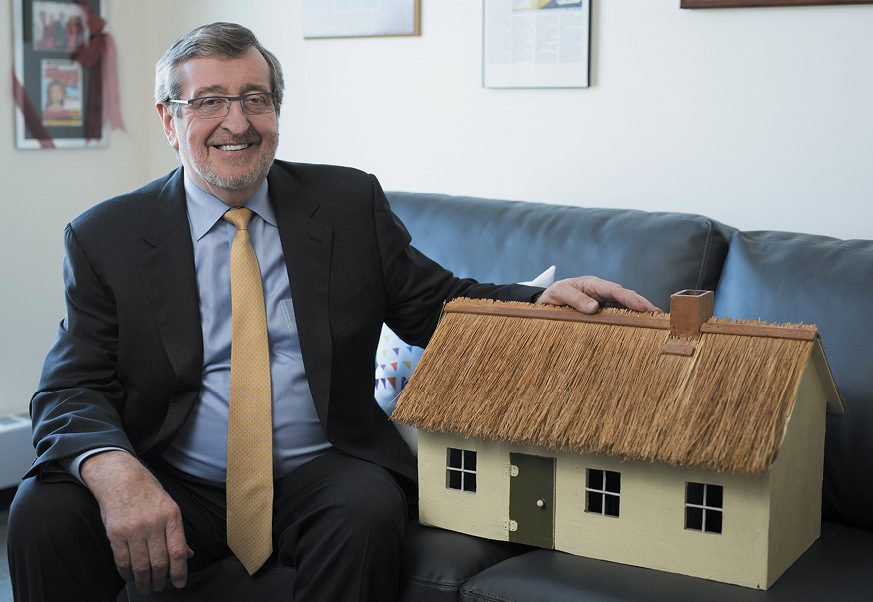
Michael Dowling with a replica of his childhood home in Ireland
What was your childhood like and how did it impact your life journey?
I have written extensively about my background in a memoir published in 2020 entitled After the Roof Caved In. One night in a rainstorm the roof of the thatched, mud-wall house that I grew up in collapsed on us as were sleeping. Fortunately, no one in the family was hurt – just wet and dirty. We lived in a farming community in West Limerick, Ireland, although we were too poor to have our own farm. As kids, we worked milking cows and doing chores for neighboring farmers. My father was a hard-working laborer but suffered terribly with arthritis, forcing him to stop working at age 41. My mother – a terrific, caring individual – was deaf but never would consider it a disability. The house we lived in had no running water, electricity or a bathroom – not even an outhouse. I was the oldest child and at age 16, I left home during the summer to work in a steel factory in Crawley, South London. I wanted to support the family and dreamed of someday being able to go to college. Reflecting on my upbringing in later years, I came to realize that growing up in this environment had many positives: the benefits of hard work, grit, and resilience, and the importance of never playing victim or feeling entitled. It also provided perspective – the understanding of knowing and experiencing what tough times are like. Poverty can also be a wonderful motivator. I never regretted or whined over my childhood experiences – they helped and shaped me. I consider myself very fortunate.
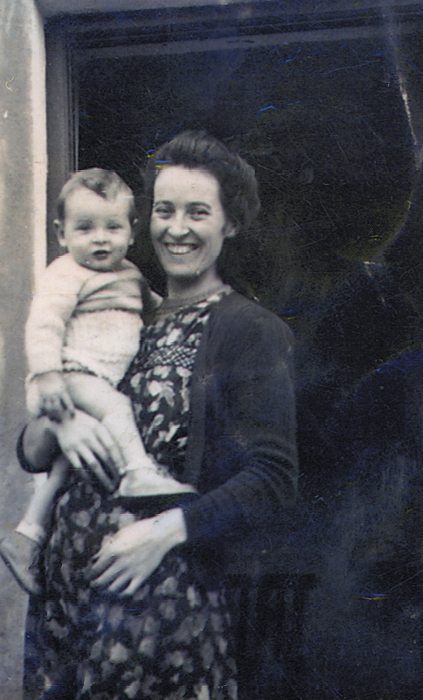
A young Michael Dowling with his mother
What influence did your parents have on your career path?
I learned the importance of discipline and hard work from my father. With him, you avoided making excuses. He was a tough taskmaster and parent – with many characteristics that would not be tolerated today. He had a tough life and never had the opportunity to pursue more than a basic education or display his many talents.
My mother was a wonderful, loving and caring individual who inspired me my entire life. She had a love affair with books, history, and education. Reading was her pastime and her periodic respite from the daily grind of a difficult life. My love of books and passion for learning came directly from her. She was an optimist – always seeing the good in every person and feeling positive about the future. She held the family together and each of us give her much of the credit for any success we have had. She did not like it when I left home, but understood its necessity. She gave oxygen to hope, decency, and kindness. I remember her continuing advice – “don’t ever let your circumstance, however difficult, limit your future potential. Everything is possible.” After my father passed, I brought her to the U.S. every year. She would stay for up to a month each time. She would go to church – she was very religious – read, take walks, and relax. She loved her visits but always looked forward to going home.
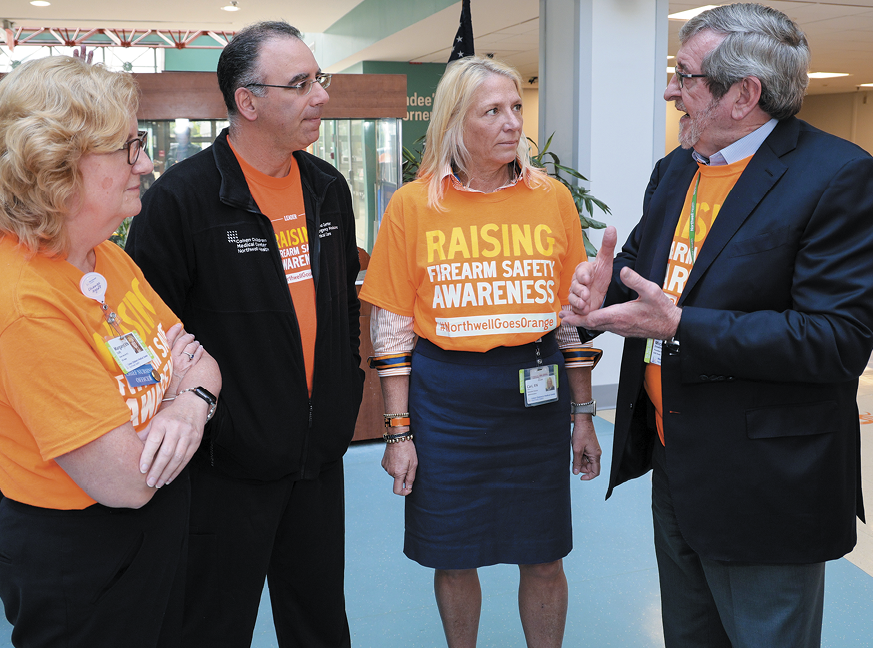
Michael Dowling has initiated numerous gun violence
prevention initiatives, including engaging with employee
advocates during National Gun Violence Awareness Day,
in honor of gun violence survivors
How do you approach your leadership style?
My personal and work lives are guided by a number of key values and principles: decency, honesty, respect, integrity, kindness, and trust. As a leader, I consider these the foundations of success. Relationships matter – personal contact, getting to know and understand people, being able to appreciate various points of view, giving people the opportunity to be engaged and contribute, and be part of the solution. I believe strongly that most individuals don’t just want to work for an organization; they want to belong to a cause, to something important, something greater than themselves. Leadership is about having a positive influence on people, inspiring them and allowing them to dream about what’s possible, so they aim high and stretch themselves. Organizations are like a mosaic – multiple components, each with its own personality and culture, but it’s the beauty and uniqueness of the whole that is extra special. That is why I see a similarity between a leader and an orchestra conductor. The latter does not need to know how to play each instrument, but he/she has to make sure there is harmony when they all play together, producing a consistent, quality product that benefits the consumer.
This, of course, requires talent, and the responsibility of the leader is to create the environment and the structures to optimize each person’s individual capabilities and personal growth. This is a core strategy at Northwell and has been a key to our success. This is also a component of why I meet all new employees – about 300 each week – and have been doing so for the more than 22 years that I’ve been CEO – building relationships and explaining the possibilities.
What do you look for when hiring talent at Northwell?
The recruitment of the best talent is one of the most critical decisions that leaders can make. While it may be a well-worn expression, employees are the greatest asset in any organization. The values they hold, the behaviors they display, and the competence and passion they exude are key to a business’ long-term success. As noted earlier, I meet weekly with all new employees at an all-day orientation program called “New Beginnings.” As CEO, I spend the first two hours with them, answer their questions (and there are many), and provide an overview of Northwell’s history, our scope of services, and other background. I discuss the strategy, the vision, the mission, the organizational structure and characteristics of the employee guidelines we are looking for: an optimistic attitude, an addiction to customer service, and team players who are innovative, competitive, and have a passion for the business of healthcare. I explain that there is no entitlement, that hard work is a fundamental requisite, and that they have an obligation and responsibility as healthcare professionals – not just a job.
Health, especially the direct provision of care, is special. People’s well-being and health is dependent on what we do each day. It requires special people – and that’s who we attempt to recruit each week.
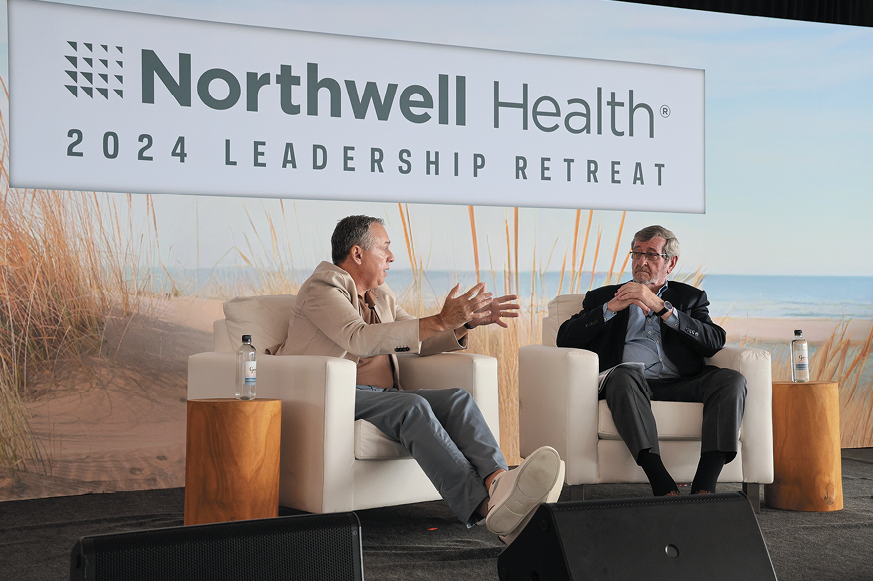
Michael Dowling hosts an annual leadership retreat for
several hundred of Northwell’s top executives and physicians,
offering a vital opportunity to build and deepen relationships
and invites guest speakers like Stephen Squeri,
Chairman of American Express, to share insights related
to Northwell’s core cultural attributes
What do you feel are the biggest challenges CEOs face?
I don’t view things through the lens of challenge – each challenge, in my view, is an opportunity to excel, to be proactive, to avoid playing victim, and to succeed. As the late self-help author and motivational speaker Wayne Dyer stated, “If you change the way you look at things, the things you look at change.” All CEOs continuously face a multitude of issues: financial, supply chain, personnel, competition, etc. The responses and the answers continue to evolve as circumstances change. There is never one right answer. That understanding is key as it requires a perpetual attitude of flexibility and adaptability. This will be especially relevant as AI accelerates and we try to come to grips with its benefits and risks.
One other point worth noting is the danger of complacency, which is the greatest peril for CEOs, especially those who believe their organizations are successful. Leaders should never take their foot off the accelerator or believe their own press releases. Maintaining your organization’s competitive edge necessitates continuous grit, hard work, resilience, entrepreneurship, and that competitive spirit on which many businesses were founded. And, of course, we all need some amount of luck.
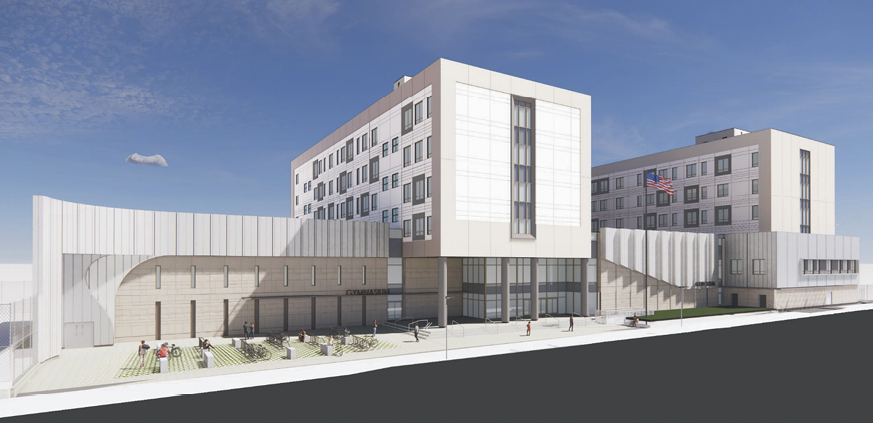
A rendering for the Northwell High School of Health Sciences,
slated to open in fall 2025 – the curriculum for this
first-of-its-kind school will focus on nursing, radiation
medicine, mental health and physical therapy
How broadly do you define health?
I am an advocate of defining it very broadly. A person’s health is affected by almost everything – much more than just the provision of medical care. The ability to have a job, the opportunity to pursue education, the neighborhood you live in, your family’s circumstance and dynamics, the food you eat, etc., all impact a person’s well-being. That is why I believe that healthcare leaders have a special responsibility to do as much as they can to influence those circumstances while also ensuring the provision of top-quality medical care. This is why we at Northwell have focused on tackling issues such as gun violence (the leading cause of death for children and adolescents), climate change (including the healthcare industry’s impact on the environment), the care of veterans, and how we prepare young people for future career opportunities. On the latter, we are working in partnership with the City of New York and the Bloomberg Foundation to open the Northwell High School of Health Sciences in the fall of 2025. The curriculum for this first-of-its-kind school will focus on nursing, radiation medicine, mental health, and physical therapy. By more closely connecting students to the world of work and dramatically increasing their opportunities for rewarding, well-paying jobs, we are improving their health and the health of their families.
We all need to broaden our perspective – not just healthcare leaders, but leaders in all industries.
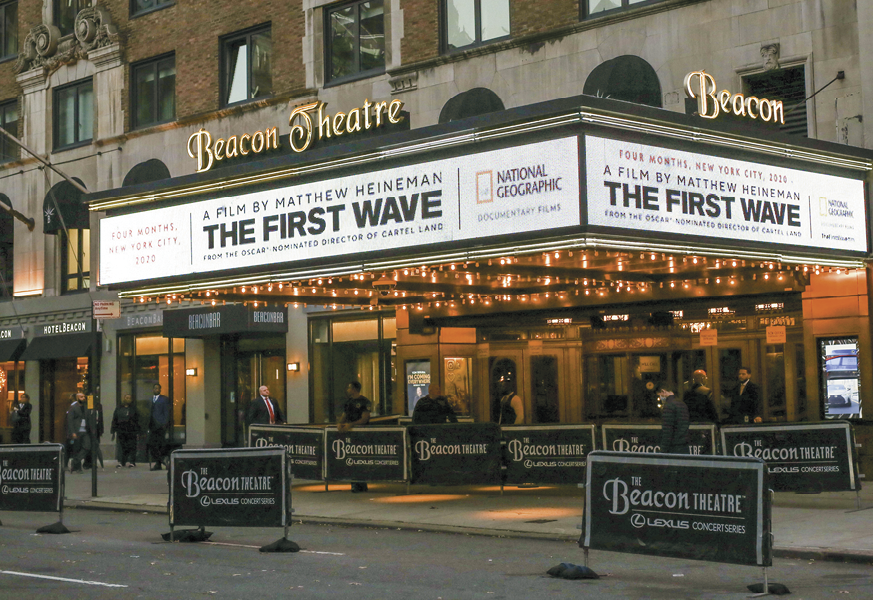
Northwell Health has participated in five documentaries
so far, including the 2021 Oscar shortlisted First Wave
What has made Northwell an industry leader?
I appreciate the compliment, but I believe that, despite our successes to this point, we still have a long way to go. As an organization, we continuously aim high and look at every challenge as an opportunity. We are innovative and competitive, optimistic, resilient, and have a strong team-oriented, collaborative culture. We are not a collection of isolated, individual entities – we are highly integrated as a corporation, yet we maintain close ties with all of the communities we serve. We are also more than just hospitals, which now comprise only 47 percent of our overall business. Throughout the region, we have more than 900 locally based outpatient locations and the most-comprehensive, post-acute set of clinical services. We are growth-oriented and continue to expand, geographically and programmatically. We serve everyone who walks through our doors, irrespective of their ability to pay, because we understand that our core commitment is improving the health of the communities we serve, providing excellent care and being addicted to customer service. As noted earlier, we also recognize our responsibility to tackle gun violence, climate change, and other social issues that impact community health.
What are your views on the future challenges in healthcare?
Being positive and optimistic is essential. As mentioned earlier, all challenges are opportunities. As we ponder the future, it’s also important to reflect on the dramatic successes and advances over the past 50 years or so in increasing life expectancy and improving the quality of life for all Americans. Think about the medical care we provide today that was almost unimaginable decades ago – in pediatrics, heart disease, cancer, orthopedics, etc. Our entire nation is benefiting from ongoing medical and scientific innovations and discoveries. In 2018, I published a book entitled Healthcare Reboot: Megatrends Energizing American Medicine, that looks at the powerful trends leading the nation’s healthcare system toward greater quality, safety, access, and affordability. As an organization with a renowned research entity, the Feinstein Institutes for Medical Research, I marvel at the innovations I see and the subsequent benefits that future generations will enjoy.
Of course, these are still many complex issues that we must respond to, such as:
• Expanding access and the provision of more-equitable care to the most-vulnerable individuals and communities that have experienced health disparities;
• Optimizing the benefits of artificial intelligence without losing the human interaction that is such an essential element in the provision of care;
• Reversing the growing disrespect for science that was so evident during the COVID-19 pandemic and has been accelerated by the growing anti-vaccine movement;
• Continuing to broaden the definition of health by focusing on the many non-medical, social determinants that impact personal health and well-being;
• Educating policymakers that quality and access cannot be fully achieved as long as government – the nation’s single-largest health insurer through Medicare and Medicaid – fails to reimburse providers at levels that cover their cost of delivering care; and
• Adequately addressing the growing problem of mental health and the many problems associated with social media.
What was the vision for launching Northwell Studios and how do you define its mission?
Contrary to what some believe, we are not building a studio. The studio is virtual; it’s all our hospitals and facilities. The goal is to harness the power of storytelling and entertainment to humanize healthcare, spark meaningful conversations, and educate the public and policy makers on the reality of what occurs each day in healthcare facilities. It will continue to expand and build upon what we have been doing for several years. During the COVID pandemic, for example, we allowed a documentary film crew into one of our tertiary hospitals (LIJ) to film the experience. The resulting documentary, called First Wave, was critically acclaimed, receiving many awards. We also were the focus of two documentary TV series on Netflix, Lenox Hill and Emergency NYC, that provide an intimate portrait of the lives of medical professionals, including their triumphs and the complications they face every day. This summer, HBO Max released a riveting, two-part documentary, One South, about the growing mental health problems facing college students and the work we are doing on suicide prevention.
Stories like these are not only educational, but spark dialogue about important social issues. The Studio initiative, organized as a separate entity within our marketing communications department, will continue this effort by collaborating with established and emerging filmmakers. It’s an exciting endeavor.![]()